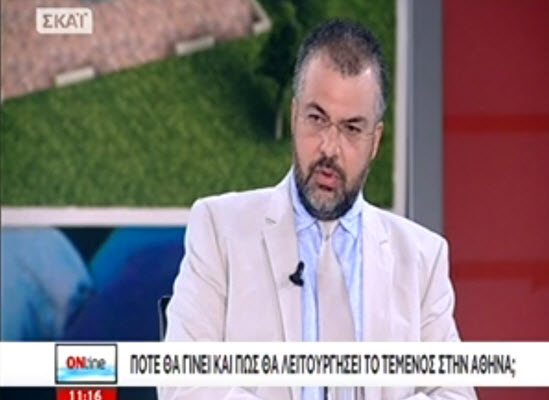
Πατήστε εδώ. Θα μεταφερθείτε εκτός ιστοτόπου ώστε να δείτε το βίντεο

11-08-16 Kalantzis says Athens mosque issue of religious freedom, in Greece’s national interest
The Education, Research and Religious Affairs Ministry’s General Secretary for Religious Affairs George Kalantzis explained the necessity of a Mosque to serve the needs of the over 200,000 Muslims in the greater Athens area, bemoaning the long delays in implementing a project that had already been approved by parliament in 2006, and now again recently in a related legislative amendment.
Kalantzis said the timing of the construction is a matter for the Ministry of Infrastructure, Transport and Networks, and that he assumes that officials there “are doing what is necessary to implement the decision of the Greek parliament “.
“The interesting issue is why parliament had to pass an amendment to a law that decided these basic choices in 2006, each time with a larger parliamentary majority. This [delay] is linked to a more general problem of the state bureaucracy – the difficulty in implementing political decisions properly and in a timely manner,” Kalantzis said.
Kalantzis explained that the delays had long left Greece open to international criticism, noting that, “It is very difficult for us who represent Greece in international forums to explain why a law passed in 2006 has not yet been implemented in 2016. Whoever bears an institutional responsibility must always remember that the national interest and the defense of our country comes first,” Kalantzis said.
“I believe the project will be completed, because it is widely understood that the real question is not just whether the mosque will be built, but rather in what way the Greek state, a European and democratic country, wants to deal with the existence of Muslim populations, and in particular in Athens, where there is a great concentration. Under the constitution, the existence of a mosque is a give, as is the existence of a synagogue or a Buddhist or Hindu temple. Many religions exist in our country and all have legal places of worship, with the exception of the Muslims in Athens,” Kalantzis said.
“We estimate that there are 200,000 to 250,000 Muslim residents of Athens, among them Greek citizens, legal migrants and undocumented migrants,” Kalantzis said.
The general secretary for religious affairs announced that upon construction of the large mosque, the plethora of small, illegally operating mosques will have a period to comply with legal requirements, otherwise they will be closed.
Those requirements are that the space must operate with a legal permit so as to be secure for those who go there, that the rights of local residents must be respected (e.g. in operating sound systems), that the name of the responsible religious functionary be declared, and that it acquire a tax registration number.
“Under these preconditions, one may be issued a permit to operate a place of prayer, and that goes for other religions as well. If they are not in conformity, they will be shut down.”
Kalantzis said that the delays left Greece open to international criticism, from the annual US State Department reports to the EU. “There is no international report on religious freedom in Greece from the year 2000 on that has not included a steadfast reference to the lack of a public mosque in Athens,” Kalantzis said.
Noting Turkey’s persistence in pressing this issue “without having any special reason that concerns them directly”, Kalantzis said that Greece’s imprudent delays, “have given Turkey the opportunity to slander our country in international organisations, such as the Organisation of Islamic Cooperation, saying that generally and abstractly that Greece is a country hostile to Islam”.
